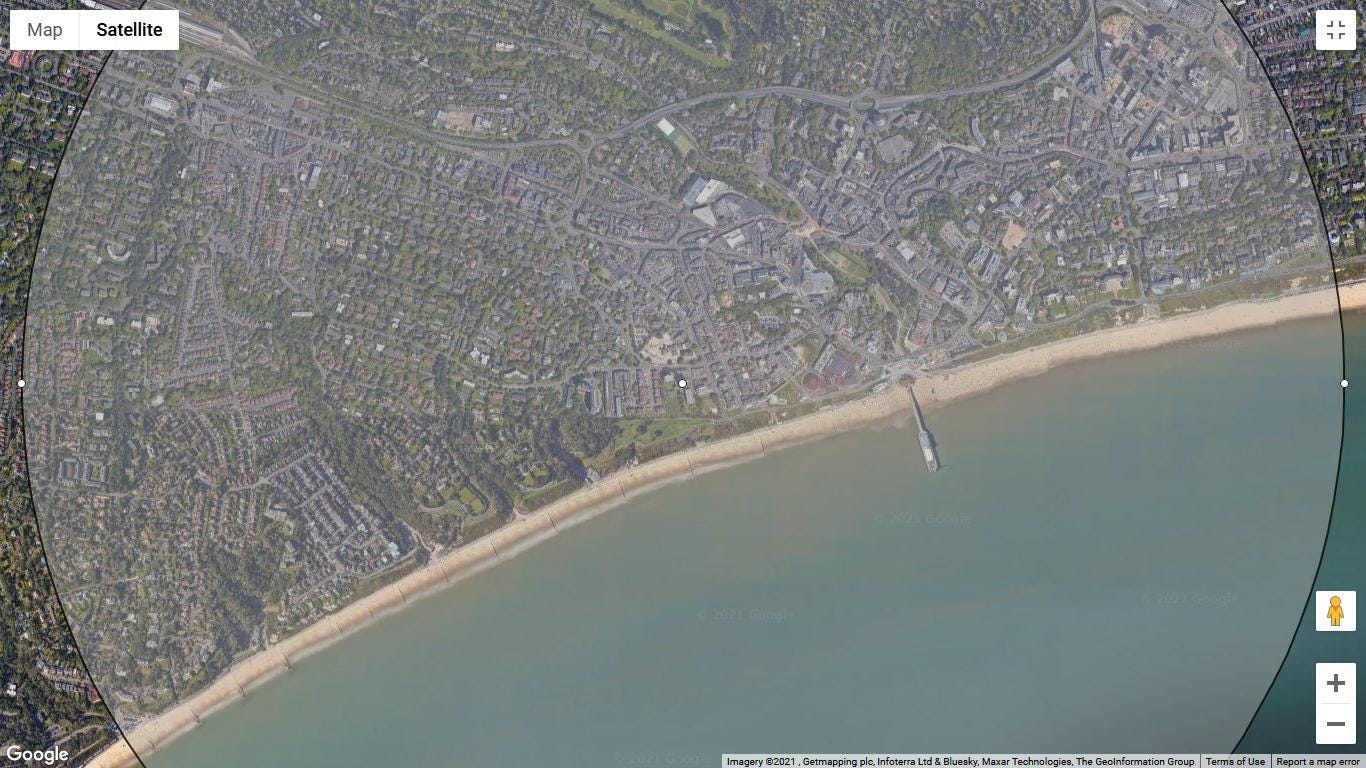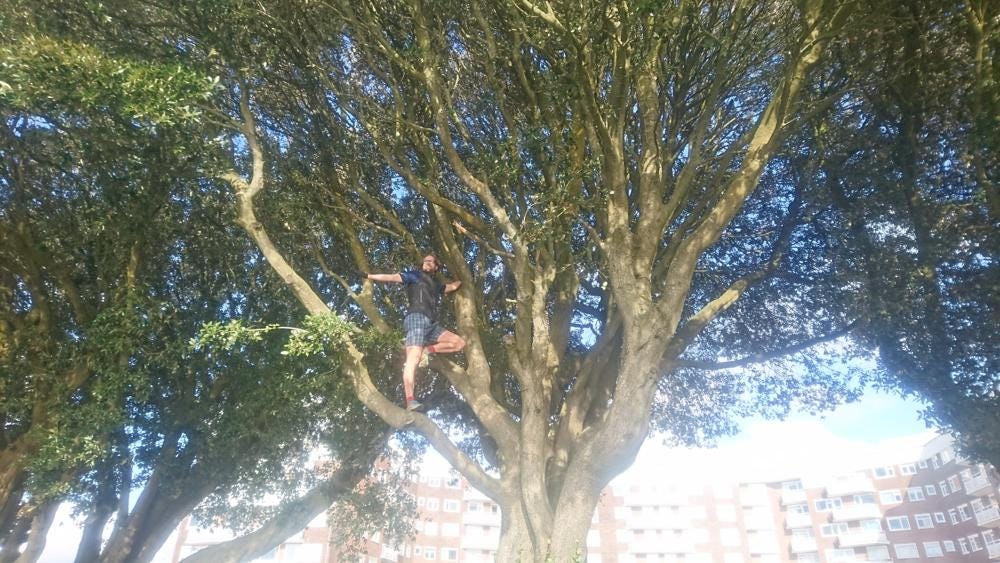The millionaire's jungle ravine
How connection with nature beats time in nature for your happiness and wellbeing
Happy Friday!
And welcome to edition 256—coincidentally the number of lunar cycles between the dawn of time and the return of the Messiah, according to the ancient Jewish prophet Jeremiah. As it happened, the aforementioned 256th lunar cycle landed on the year of the First Crusade, an event that was catastrophic for Jewish populations in Germany and beyond.
It was a new moon yesterday so be careful what you prophesy!
⛰️ Read this story on my blog instead if you like (1,300 words)
Adventures in the millionaire’s jungle ravine!
Or: How connection with nature beats time in nature for your happiness and wellbeing
You’d have thought that, living alone for a year in a medium-sized town without access to powered transport, I would have explored every corner of greenspace within a five kilometre radius of where I live.
Not even close. This week, by opening my eyes and following my nose, I discovered pockets of unexplored nearby nature less than 1,500 metres from home.

It’s so easy to slip into patterns of movement, always taking exercise along the same well trodden paths. I don’t think this problem is exclusive to beachside locations, where it’s easy to feel penned in by the town and the ocean. This is going to sound ridiculous, but it took me three years living in New Cross, London before I discovered this river called the Thames—and that was only 1,100 metres from home.
Earlier this week, a friend took me on a nighttime ramble over the clifftops, ending up on a promontory overlooking the white noise breakers and distant cruise ships of Poole Bay. It was a contemplative spot for a new moon, the stars of Orion the rapist high above and the twinkling of brake lights in the car park far below.
There’s no reason for anyone to climb up to this lookout: the road has a gentler gradient to the town and the ocean acts as a magnet, drawing people down on the shortest electrical pathway. I have walked along the promenade here uncountable times in the past year. If you must have statistics, then, according to Strava, I have run past this spot on no fewer than 184 occasions, without once looking up and noticing.
There are two memorial benches here, dug into the sandy, salty soil among the steadfast pine trees. Better yet: someone has thrown a wooden rope swing over the lowest branches, still four metres overhead. We swing in the silence and I know that this discovery will become a part of my day-to-day.
Finding unexpected adventure in the millionaire's jungle ravine
Yesterday I took a wrong turn, taking a right when all historical data indicates I should have carried straight on along the sea front. But the arctic wind was blowing at my back and I didn’t want to become one of those I saw on the return journey, walking into the gale with face masks pulled down to protect themselves from the spitting sand.
So I took a right turn, into what felt like a ravine, with sheer loamy walls underpinned by pines. The concrete path flowed gently upstream with Victorian ironwork overhead and rough cut steps laddering up to the hidden turrets of expensive villas.
The footpath coasted left and I could see two young mothers pushing prams down towards me—towards the wind-backed ocean. But I didn’t want to leave the pines yet and the ravine continued invitingly ahead, a quiet, ancient, grass-dried river, promising overgrown adventure and restoration.
As I walked on, the ravine closed in, the pedestrian pathways disappeared up beyond the canopy, the grassy floor gave way to thistle and thorn. Rhododendrons greedily clutched at scraps of sunlight. Black bin bags had been thrown down from on high and stood at the side of the path, waiting for collection. A supermarket shopping trolley sank into a thin layer of mud, a long way from home. The path—I think it was still a path—twisted over and around roots and stumps, leading me on into the darkening underworld of the jungle.
Somehow, against all odds, I had found something that made me feel something. Senses on stalks. In the silence, I could hear my heart in my chest and my blood in my ears. The secret ravine had me gripped by the seat of my being.
I didn’t bring a phone on this walk so I can’t show you any photographs. And I’m glad. Not only because my smartphone can get in the way of my connection with nature, but also because, ducking under the out-thrust bough of a denuded beech, I realised that photography would be an invasion of privacy.
I was not alone. For here, at the butt-end of the ravine, overlooked by the views from million pound properties, was a clutch of six forgotten tents. I stood still, breath short, straining my senses for signs of strangers. Who lives in a place like this? But the camp was silent. Its occupants, presumably, out on business.
As I moved through the camp, the tents became more ambitious until I reached the premium pitches at the back of the canyon, where the goat track was finally choked out by thorny scrub.
Here, two large tents faced each other, guy ropes pulling the canvas taut against the branches of overgrown rhododendron. A table was folded out between them and two tarpaulins stretched over as a canopy to protect the patio space from rain. A bicycle was locked up against a pole of a tree. I could smell the tang of human sweat and the faintest memory of a campfire.
I thought about leaving my card, but had none to leave. Perhaps they’ll see my bootprints and wonder who dropped by. Perhaps they had been watching me all along, assessing friend or foe.
I tried to bushwhack my way past the tents, through to the ruins of Skerryvore, where Robert Louis Stevenson wrote Kidnapped, longing for escape from the ‘slow dissolution’ of England, ‘Land of Counterpane’. But, scrambling up the mud side walls, I was stopped short by a chain link fence and a line of garden sheds.
I slipped back down into the shelter of the ravine and retraced my steps, back through the undergrowth, past the shopping trolleys and the tents. The path widened and opened. I could hear the burbling of a water main, squirrels leapt from under my feet. A mother and her daughter pushed their bikes over the iron wrought bridge as I passed beneath.
How connection with nature beats time in nature for happiness and wellbeing
Earlier this year, Miles Richardson and a team from the University of Derby published a paper suggesting that the restorative benefits of nature come from ‘moments, not minutes’.
The study found that how long we spend in nature wasn’t sufficient to explain significant increases in our happiness and sense of living a worthwhile life or reductions in our feelings of ‘illbeing’—depression and anxiety.
According to Richardson, what really counts is how connected we feel to nature and whether or not we actually notice the natural environment around us. This noticing happens through ‘simple actions’: relaxing in a garden, watching bees and butterflies, smelling flowers, listening to birdsong, collecting shells or pebbles, drawing, painting or photographing a beautiful plant—or perhaps celebrating a new moon by climbing the clifftops.
I have been very lucky this week to enjoy a few of these moments, from swinging among the pines to beating through the ravine undergrowth. I find it immensely encouraging that we don’t all have to be like Henry David Thoreau, who couldn’t be content without at least ‘four hours a day … sauntering through the woods and over the hills and fields, absolutely free from all worldly engagements’.
So when we’re out in nature this weekend, let’s all—pause—sit—notice—the green life growing around us.
How to notice nature: use this calming sensory meditation
A great way of noticing nature that I use is the classic 5-4-3-2-1 sensory meditation. Find a comfortable spot, ideally surrounded by nature, but allow whatever your environment allows.
Notice 5 things you can see.
Notice 4 things you can feel.
Notice 3 things you can hear.
Notice 2 things you can smell.
Notice 1 thing you can taste.
This meditation can take five minutes; it can take five hours. Completely up to you. Let me know how you get on!
Thanks to L.H. for the starry nighttime ramble along the clifftops.
‘Eye-opening’, ‘mind-blowing’, ‘Zoom-bungling’
Everyone seemed to have a lovely time at my first Rewild Your Job workshop last Friday. At the risk of blowing my own bugle, the session got some great feedback, like this:
I think we all know that nature is important, but I didn’t know that there were so many scientific studies to prove it. Thank you so much for opening our eyes!
And this:
I’m a nature photographer and I interact with nature pretty frequently, but even then I wasn’t aware of so many diverse aspects of nature that you have pointed out. It was absolutely mind-blowing!
I would love to give this workshop again so please let me know if you or anyone you know might be interested—individuals, businesses, WI groups, etc.. Check out the updated workshop page and either reply to this email or:
If you’d like to watch the workshop and play along with the activities, the recording is up on Youtube. Note: this was my first ever Zoom presentation so began with the customary technical faff. To skip all that, please fast forward to 4m50 😅 And please let me know what you think!
Thanks again to Anne-Laure Le Cunff and the awesome Ness Labs community for being so generous with their time, energy and patience!
Could this be the end?! Yes.
It seems like only three weeks ago that we were all settling down to listen to the first episode of Foiled IV. And, lo and behold, here we are already preparing for the final episode, the finale to end all finales (unless the BBC recommission us for another series, in which case we need to find a way out of the hole we have quite literally dug for ourselves!).
I hope you’ve enjoyed your appointment at Bleach for the Stars. Thank you for listening, thank you for sharing and thank you for messaging!
Episode 1 with Garnon Davies as Tonypandy’s local baguettes kingpin (online for another couple of weeks)
Episode 4 with Kiell Smith-Bynoe as Mike the karaoke booth manager (on air 1830 Monday)
Subscribe to the whole series on BBC Sounds
Reminder of two open invitations
♠️ Give me a shout if you want to join a friendly game of online poker. The next game will be on Monday night, but it’s fairly flexible. £10 buy in and winner takes all. So far we’ve collectively funded three toilet twinnings and ‘a shitload of Welsh Cakes’.
🖨️ I’m still printing and posting interesting long form articles I’ve read. Drop me a line with your address is you’d like one. Waiting to go out is some groovy writing on ‘wishful worries’, Great Anarchists and whether it’s possible to have fun in quarantine.
Any more for any more?
This week: three solutions looking for a problem.
Are you a reader who really can’t be arsed with taking notes?
Readwise will automatically remind you of great passages you read long ago in books you love. You can also upload your own highlights by taking a photograph. Readwise will do the rest of the work and email you a selection every day.
I have added a selection of the best books I’ve ever read and yesterday I was reminded of this passage from the best book I read in the whole of 2018, Lisa Feldman Barrett’s How Emotions Are Made:
Numerous experiments showed that people feel depressed when they fail to live up to their own ideals, but when they fall short of a standard set by others, they feel anxious.
Thanks to Alastair Humphreys for recommending this app—I love it!
Solved! Are you a great writer struggling to write killer headlines?
I can highly recommend that you try Headline Studio. I’ve long known that I’m rubbish at headline writing, but now I have a free tool that can quantify, more or less, how bad I am—and help me improve.
Naturally, the headlines of these bullet points were workshopped using Headline Studio. This one started out as ‘Are you a writer looking to write better headlines?’ which scored 70 on their scale—not bad at all. But the title you’ve ended up reading scores a mighty 82. The question is: did it work?
Does your awesome Wordpress blog suffer from slow page load times?
Then you need to know exactly what I did to boost my Google PageSpeed score from a laggardly 65 to a near-perfect 99. Even if you don’t write a Wordpress blog, I’d love for you to click on that link just to admire how incredibly fast it loads!
That’s all for this week. I hope you have a blustery weekend in the out-of-doors. If I climb to the top of my tree and you climb to the top of yours, maybe the mycelial network will touch tips on our behalf.
All that remains is for me to thank you for reading and sharing this newsletter. You wouldn’t believe how much goes into writing one of these things and it means so much when you lovely people share it with your friends.
Big love,
dc:
CREDITS
Hello, I’m David Charles and I’m a UK-based writer and outdoor instructor. Say hello by replying to this email, or delve into 500+ other articles on davidcharles.info.
9.5 percent funded ▲▲△△△△△△△△△△△△△△△△△△
These free weekly emails are supported by readers who scroll all the way to the bottom—readers like you 😁 Help unlock the commons by becoming a paying subscriber for £30 per year—about 58p per newsletter. To say thanks, I’ll send you a book!





